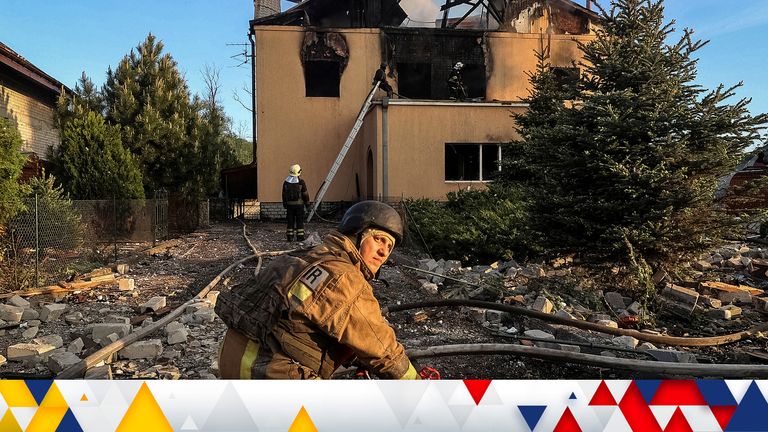Putin knows Ukraine's fate hinges on Western support - so how far will the West go?
Russia is capitalising on Ukraine's shortage of weapons and ammunition to seize the initiative on the battlefield.
After two years of protracted attritional warfare, Russia is once again on the front-foot in Ukraine.
If the West is to deny President Putin a strategically important success in Ukraine, it will need to find new ways to combat Russia's aggression.
To date, the West has limited Ukraine's ability to strike back at Russia by restricting the use of Western weapons - particularly long range missiles - to Russian-occupied Ukrainian territory, for fear of escalating the conflict.
However, Ukraine needs the maximum flexibility possible if it is to prevail over its numerically superior adversary - this is one of the core topics covered by our military analyst Sean Bell in this week's RedMatrix podcast.
Russian momentum
The US's $60bn package of military aid to Ukraine was finally agreed at the end of April after months of delay.
As Bell highlights, President Putin is capitalising on Ukraine's shortage of weapons to intensify his offensive operations in the Donbas, where his forces are gaining momentum and seizing numerous small settlements.
Whether these tactical gains can develop into a strategic breakthrough remains to be seen, but momentum is a vital component of warfare - and Russia has it.
Securing approval in the US for the $60bn of military aid was not a simple process.
Understandable concerns over the relative priorities of domestic issues amid support for a non-NATO nation thousands of miles away divided opinion; it was no coincidence that US secretary of state Antony Blinken highlighted the delivery of US military equipment and ammunition had created "jobs for the US".
No strikes on Russia
The aid package also included a number of long-range missiles - the US Army ATACMS.
These systems have the range to threaten all Russian forces in occupied Ukraine, and could be crucial in helping Ukraine turn the tide of the war back in Ukraine's favour.
However, defence secretary Lloyd Austin reiterated these weapons could not be used to target within Russia itself.
Wars on this scale consume vast resources. Russia relies on its oil exports to provide revenues to invest in its national defence industrial base, and also purchase vast quantities of munitions from North Korea and Iran.
Therefore, President Zelenskyy has deliberately targeted some of Russia's immense oil refining capacity to reduce Russia's oil revenues.
However, any reduction in global supply of oil inevitably increases the price. Austin was questioned on this point at one of the defence department hearings, where it was suggested this was one of the reasons that the US placed limitations on the use of US weapons.
Putin's sabre-rattling
In contrast, during a visit to Kyiv earlier this month, Lord Cameron announced it is up to Ukraine to decide how to use British weapons and insisted it has the right to strike targets on Russian territory.
This notable shift in stance from the UK prompted the Russian foreign ministry to claim this would have "catastrophic" consequences.
As Bell notes, President Putin knows strategic success in Ukraine relies on deterring increased Western support for Ukraine, and to date, his sabre-rattling has successfully tempered Western political appetite for an escalation.
Regardless of the political rhetoric, the West faces a stark choice.
Ukraine is utterly dependent on Western support to stem the Russian invasion. President Putin knows this, so he is using all tools at his disposal to deter increased Western involvement.
However, should Putin prevail, what next?
If a nuclear superpower is at liberty to attack any non-nuclear power without consequence, that has profound implications for global security.
But how far is the West prepared to go to stop Putin's brutal offensive?


